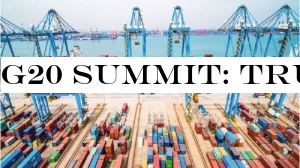
US President Donald Trump and Chinese President Xi Jinping reached the agreement on the sidelines of the G20 summit in Japan.Mr Trump said the talks had been "excellent".He had threatened to impose an additional $300bn (£236bn) in tariffs on Chinese imports.However after the meeting in Osaka, he confirmed that Washington would not be adding the additional tariffs, and that he would continue to negotiate with Beijing "for the time being".he US president also announced that American companies could continue to sell to the Chinese technology firm Huawei, which Washington has banned because of security concerns.This move appears to be a big concession to Beijing, says the BBC's Rupert Wingfield-Hayes, in Osaka.The US and China are locked in an escalating trade battle.US President Donald Trump has complained about China's trading practices since before he took office in 2016.The US launched an investigation into Chinese trade policies in 2017.
It imposed tariffs on billions of dollars worth of Chinese products last year, and Beijing retaliated in kind.After months of hostilities, both countries agreed to halt new trade tariffs in December to allow for talks.Optimism had grown over the prospect of a deal, but that faded, and now the US has more than doubled tariffs on $200bn (£153.7bn) worth of Chinese products.Beijing retaliated three days later with tariff hikes on $60bn of US goods.What tariffs are in place?Last year, the US imposed three rounds of tariffs on more than $250bn worth of Chinese goods.The duties of up to 25% cover a wide range of industrial and consumer items - from handbags to railway equipment.Beijing hit back with tariffs on $110bn of US goods, accusing the US of starting "the largest trade war in economic history".China has targeted products including chemicals, coal and medical equipment with levies that range from 5% to 25%.It has also targeted products made in US districts with strong support for the Republicans, and goods that can be purchased elsewhere, such as soybeans.After agreeing a truce in December, both sides began to talk.But on Friday the US raised tariffs on $200bn of Chinese products to 25% from 10%.
China retaliated but officials say the countries are still talking.The US has also started the process for hitting an additional $300bn of Chinese goods with tariffs.Why tariffs?Tariffs imposed on Chinese goods, in theory, make US-made products cheaper than imported ones, and encourage consumers to buy American.
They are also increasingly seen as a negotiation tactic in the trade war.What is the impact so far?Both US and international firms have said they are being harmed.S and China agree to restart trade talksThe leaders of the two countries reach an agreement to ease a row that has fuelled an economic slowdown.Mr Trump accused China of stealing intellectual property and forcing US firms to share trade secrets in order to do business in China.China, in turn, said the US's demands for business reform were unreasonable.The feud escalated in the months leading up to the summit, after talks between the two countries collapsed in May.How will the current breakthrough change the situation?Speaking after his meeting with Mr Xi at the summit, the US president said negotiations were "back on track"."We had a very good meeting with President Xi of China, excellent, I would say excellent, as good as it was going to be," Mr Trump told reporters.
"We discussed a lot of things and we're right back on track and we'll see what happens."In a statement, China's foreign ministry said negotiators from both sides would discuss the specific details, but did not elaborate.China's official state news agency Xinhua also quoted Mr Xi as saying: "China and the US have highly integrated interests and extensive co-operation areas and they should not fall into so-called traps of conflict and confrontation."Media captionTrade war squeezes California's wine countryHas the Huawei dispute been resolved?The clampdown on dealing with Huawei has been a high profile part of the wider trade conflict between the US and China.Mr Trump's decision to allow US companies to continue to sell to the Chinese technology firm is being seen as a substantial concession to the Chinese.The US president is reversing a US ban imposed last month on Huawei buying US goods without a licence - including from Google, which is crucial to many of the Chinese firm's products.The ban had been expected to cost the firm $30bn (£24bn) in revenue this year, and sparked fears of a "technology cold war" between the two nations.But American companies have also been stopped from buying from Huawei, because Washington says its technology poses a national security risk.So the latest US move does not bring a complete end to the dispute.
Mr Trump said the Huawei situation would be dealt with "at the very end" of trade talks between the US and China.

 14
14






